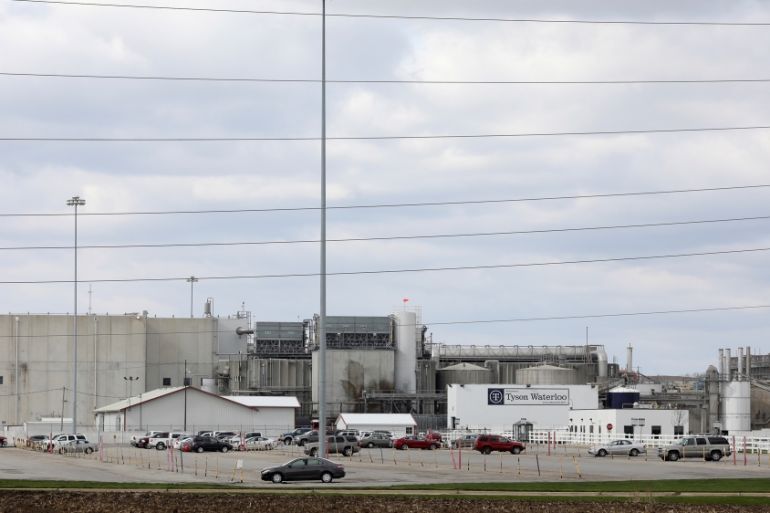Tyson Foods expects to keep idling meat plants citing coronavirus
Tyson, Smithfield Foods Inc and JBS USA have shuttered meat plants in recent weeks, raising fears about meat shortages.

Tyson Foods Inc expects to continue idling meat plants and slowing production because of the coronavirus pandemic, the company said on Monday, signalling more disruptions to the United States food supply.
Tyson reported lower-than-expected earnings and revenue for the quarter ended on March 28, before meat processors began shutting plants as COVID-19 spread through slaughterhouses. Shares of the Jimmy Dean sausages maker fell more than 7 percent after the company said increased demand for meat at grocery stores had not completely offset lost sales to restaurants.
Keep reading
list of 3 itemsWFP warns food insecurity could more than double in East Africa
Exports of Russian wheat dry up, stoking food security concerns
US President Donald Trump last week deemed meat-packing plants “critical infrastructure” that must stay open, in an executive order to protect the nation’s supply. Tyson, Smithfield Foods Inc and JBS USA have shuttered plants in recent weeks, limiting pork and beef production and heightening fears about shortages.
“We have and expect to continue to face slowdowns and temporary idling of production facilities from team member shortages or choices we make to ensure operational safety,” Tyson said in a statement.
Tyson warned prior to Trump’s order that millions of pounds of beef, pork and chicken would vanish from US grocery stores because of plant shutdowns. Its chairman said the US “food supply chain is breaking” as farmers have been euthanising livestock because they lost markets for them.
Tyson projected meat sales will fall in the second half of the year as restaurants and other food outlets suffer as consumers stay at home during the pandemic. The company said it does not expect chicken prices will improve for the rest of its fiscal year.
“The volume increases in retail have not been sufficient to offset the losses in food service and as a result, we expect decreases in volumes in the second half of fiscal 2020,” Tyson said.
The company’s sales rose 4.3 percent to $10.89bn in the second quarter ended March 28. Analysts had expected revenue of $10.96bn, according to IBES data from Refinitiv.
Net income attributable to Tyson fell to $364m, or $1 per share, from $426m, or $1.17 per share, a year earlier.
Excluding items, the company earned 77 cents per share, missing estimates of a profit $1.04 per share. Its shares fell 3 percent in early trading on Monday.